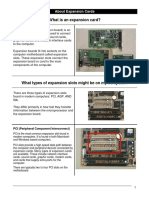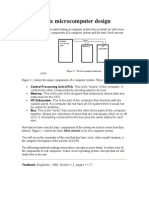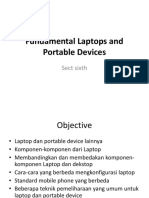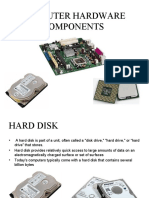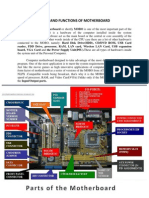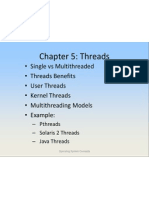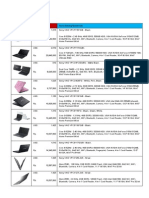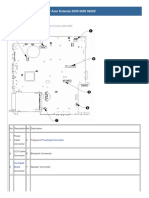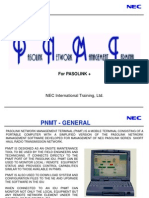Expansion Slot
Expansion Slot
Uploaded by
Fazrul RosliCopyright:
Available Formats
Expansion Slot
Expansion Slot
Uploaded by
Fazrul RosliCopyright
Available Formats
Share this document
Did you find this document useful?
Is this content inappropriate?
Copyright:
Available Formats
Expansion Slot
Expansion Slot
Uploaded by
Fazrul RosliCopyright:
Available Formats
Num.
1. 2. 3. 4. 5.
Topic
Cover Introduction Grapic Conclusion Reference
Until
1-2 3-10 11-18 19 20
expansion slot An opening in a computer where a circuit board can be inserted to add new capabilities to the computer. Nearly all personal computers except portables contain expansion slots for adding more memory, graphics capabilities, and support for special devices. The boards inserted into the expansion slots are called expansion boards, expansion cards , card , add-ins , and add-ons
Expansion
slots for PCs come in two basic sizes: half- and full-size. Half-size slots are also called 8-bit slots because they can transfer 8 bits at a time. Full-size slots are sometimes called 16-bit slots. In addition, modern PCs include PCI slots for expansion boards that connect directly to the PCI bus.
An expansion slot is used to add additional devices to a computer system that the manufacturer may not have included, or to add additional / redundant devices to supplement those present. Examples of devices that may be installed via an expansion slot include: Graphics cards Sound cards Video capture cards SATA controllers Dial-up modems Ethernet controllers USB hubs FireWire hubs
An
opening in a computer where you can insert a printed circuit board. Slots are often called expansion slots because they allow you to expand the capabilities of a computer. The boards you insert in expansion slots are called expansion boards or add-on boards. Do not confuse slots with bays. Bays are sites within the computer where you can install disk drives. Typically, slots are in the back of the computer and bays are in the front.
AGP AMR CNR EISA ISA PCI PCIe VESA
ISA
slots are an older type of expansion slot, twice as big as PCI slots and slower than PCI slots as well. ISA slots are usually black, while PCI slots are usually white. ISA slots are not used much anymore, but most computers still have at least one of them. ISA networking cards, ISA sound cards, ISA video cards, and other types of ISA expansion cards can be used in the ISA slots.
PCI
slots can handle 64 bits of data at a time, twice as fast as ISA slots, which can only handle 32 bits of data at a time. PCI is an abbreviation for "Peripheral Component Interconnect." A 64-bit PCI slot has 64 connections to the motherboard, and each connection is capable of handling 1 bit of data at a time. A 32-bit ISA slot has 32 connections to the motherboard, each handling one bit of data at a time
The AGP expansion slot connects AGP video cards to the motherboard. The video card shown above is an AGP GeForce FX 5500. Video cards are also known as graphics cards. They process video and image data that will be displayed on your screen. The monitor plugs into the video card. AGP is an abbreviation for Accelerated Graphics Port. Most AGP video cards are capable of a higher data transfer rate than PCI video cards. Video cards, like the one shown above, simply plug into an AGP slot and connect a monitor or other video display device to a computer, usually through the VGA port. The video card shown above has three different ports, for three different types of monitors
You might also like
- Sample Final Exam EECS388 - Fall 2020Document19 pagesSample Final Exam EECS388 - Fall 2020Jeren ChenNo ratings yet
- Power On Self TestDocument6 pagesPower On Self Testsaurabh278No ratings yet
- Exam 1 - HardwareDocument2 pagesExam 1 - Hardwaresawon100% (1)
- Module 2 - Reading5 - ChipsetDocument3 pagesModule 2 - Reading5 - ChipsetChristopher AdvinculaNo ratings yet
- Typical Configuration of Computer SystemDocument90 pagesTypical Configuration of Computer Systemgani100% (1)
- Computer-Architecture 2 PDFDocument0 pagesComputer-Architecture 2 PDFwww.bhawesh.com.npNo ratings yet
- Micro Star ms-7326 Motherboard ManualDocument3 pagesMicro Star ms-7326 Motherboard ManualAlex MatiashNo ratings yet
- About Expansion CardsDocument3 pagesAbout Expansion CardsEmin Kültürel0% (1)
- Motherboard Components... CSEDocument28 pagesMotherboard Components... CSEAtulay Mahajan50% (2)
- Switch and RouterDocument7 pagesSwitch and RouterIsmail Hossain RanaNo ratings yet
- UC 1 Computer HardwareDocument27 pagesUC 1 Computer HardwareCorazon ReymarNo ratings yet
- Lesson 4 Personal Computer Hardware Components (Internal Devices)Document22 pagesLesson 4 Personal Computer Hardware Components (Internal Devices)MELCHOR CASTRONo ratings yet
- MotherboardDocument17 pagesMotherboardyash bansodNo ratings yet
- A Computer Maintenance and Repair A CompDocument15 pagesA Computer Maintenance and Repair A CompEphrem ChernetNo ratings yet
- 04 Overview of Preventive MaintenanceDocument10 pages04 Overview of Preventive MaintenanceOudom 22No ratings yet
- All Rights Reserved: Ateneo Computer Science Center Ateneo de Davao UniversityDocument59 pagesAll Rights Reserved: Ateneo Computer Science Center Ateneo de Davao Universityapi-19939410No ratings yet
- Computer Hardware ServicingDocument5 pagesComputer Hardware ServicingJamae SantosNo ratings yet
- Perform Computer OperationsDocument29 pagesPerform Computer Operationsreynald manzanoNo ratings yet
- Cha-3 - Computer Hardware MaintenanceDocument72 pagesCha-3 - Computer Hardware Maintenancefayeraleta2024No ratings yet
- How To Install A PrinterDocument9 pagesHow To Install A PrinterMunir50% (2)
- Basic Microcomputer DesignDocument25 pagesBasic Microcomputer Designmhel_almoNo ratings yet
- Computer HardwareDocument23 pagesComputer HardwareNisan SfumatoNo ratings yet
- Block Diagram of MotherboardDocument9 pagesBlock Diagram of MotherboardJay Zala0% (1)
- Hard DiskDocument3 pagesHard DiskBILAL ZAFARNo ratings yet
- Fundamental Laptops and Portable DevicesDocument45 pagesFundamental Laptops and Portable Deviceshani100% (1)
- SIMD PresentationDocument28 pagesSIMD PresentationHuzaifaNo ratings yet
- Computer Organization: Instruction Set ArchitectureDocument148 pagesComputer Organization: Instruction Set ArchitecturekaneeshaNo ratings yet
- 23 Computer Application Commerce Unit-02Document42 pages23 Computer Application Commerce Unit-02Kishore KrishnanNo ratings yet
- MotherboardDocument27 pagesMotherboardமகான் சிறோன்No ratings yet
- The Component of System UnitDocument52 pagesThe Component of System UnitgtNo ratings yet
- CS 403-Week 1 ModuleDocument24 pagesCS 403-Week 1 ModuleJudielyn CualbarNo ratings yet
- DL1 Interview QuestionsDocument41 pagesDL1 Interview QuestionsGanesh WarangNo ratings yet
- Image - Utility For TBI FileDocument3 pagesImage - Utility For TBI FilepraveensamlNo ratings yet
- Tech Interview Questions: Expand BIOS: A) Basic InputDocument12 pagesTech Interview Questions: Expand BIOS: A) Basic InputSyed Abdul Hafeez50% (2)
- Chapter 3: Hardware-CPUDocument18 pagesChapter 3: Hardware-CPUHala ZidanNo ratings yet
- Computer Hardware ComponentsDocument11 pagesComputer Hardware ComponentsSadir ZubairNo ratings yet
- Comptia A+ Lab ManualDocument4 pagesComptia A+ Lab ManualRon NecesitoNo ratings yet
- Lab ManualDocument42 pagesLab Manualtejap314No ratings yet
- PC BasicsDocument19 pagesPC BasicsPavleŠlehtaNo ratings yet
- 3.1.2.6 Lab - Install WindowsDocument2 pages3.1.2.6 Lab - Install WindowsHaris AliNo ratings yet
- Functions and Type of Computer CardsDocument13 pagesFunctions and Type of Computer Cardsbmanisundaram100% (1)
- Lesson Plan Teaching Methods of ComputerDocument3 pagesLesson Plan Teaching Methods of ComputerTaleni Junior100% (1)
- Questions About Motherboard PDFDocument27 pagesQuestions About Motherboard PDFrixand731No ratings yet
- Multimedia Systems Design: by Prabhat K. Andleigh, Kiran ThakrarDocument8 pagesMultimedia Systems Design: by Prabhat K. Andleigh, Kiran ThakrarzwingliNo ratings yet
- The Common Network DevicesDocument14 pagesThe Common Network DevicesNylevonNo ratings yet
- Reviewing The Basics Chapter 1Document2 pagesReviewing The Basics Chapter 1zahed83No ratings yet
- Chapter 6 8086 Hardware Specifications PDFDocument42 pagesChapter 6 8086 Hardware Specifications PDFseiyfuNo ratings yet
- Parts of A Computer AssignmentDocument7 pagesParts of A Computer Assignmentdipankar.gede23No ratings yet
- Parts and Functions of MotherboardDocument4 pagesParts and Functions of MotherboardJimmySyNo ratings yet
- It Final Exam, Name: - DateDocument1 pageIt Final Exam, Name: - DateAbdallah TOYONo ratings yet
- Computer System Architecture Lab Report 4Document7 pagesComputer System Architecture Lab Report 4290 874Sheikh hasanNo ratings yet
- OSPF SlidesDocument50 pagesOSPF Slidesmohcine999No ratings yet
- Attaching Expansion Card To Expansion SlotDocument6 pagesAttaching Expansion Card To Expansion SlotJovy Ann San Luis100% (1)
- Peripherals of A ComputerDocument16 pagesPeripherals of A ComputerAkmal Hisham100% (1)
- DCP Orientation HandbookDocument30 pagesDCP Orientation HandbookOnin C. OpeñaNo ratings yet
- Parts of A MotherboardDocument32 pagesParts of A Motherboardgerrygohil100% (1)
- Darshan Institute of Engineering & Technology: Advance Processors UNIT-2Document42 pagesDarshan Institute of Engineering & Technology: Advance Processors UNIT-2Ravikiran TarakNo ratings yet
- 16 Installing DriverDocument12 pages16 Installing DriverJaveed AhamedNo ratings yet
- Network Topologies PDFDocument7 pagesNetwork Topologies PDFsyedpandt0% (2)
- Sample For Computer Application CictDocument20 pagesSample For Computer Application CictJohn AyaraNo ratings yet
- Project Contentfp521Document74 pagesProject Contentfp521Fazrul RosliNo ratings yet
- Data Structures & Algorithm AnalysisDocument26 pagesData Structures & Algorithm AnalysisFazrul RosliNo ratings yet
- The Major Categories of Pricing Objectives & Pricing Objectives For Nonprofit OrganizationDocument5 pagesThe Major Categories of Pricing Objectives & Pricing Objectives For Nonprofit OrganizationFazrul RosliNo ratings yet
- Non Profit MarketingDocument5 pagesNon Profit MarketingFazrul RosliNo ratings yet
- Sorting 1Document27 pagesSorting 1Fazrul RosliNo ratings yet
- CPU SchedDocument29 pagesCPU SchedFazrul RosliNo ratings yet
- MemoryDocument9 pagesMemoryFazrul RosliNo ratings yet
- Memory Management: Background Swapping Contiguous AllocationDocument51 pagesMemory Management: Background Swapping Contiguous AllocationFazrul RosliNo ratings yet
- Power SupplyDocument18 pagesPower SupplyFazrul RosliNo ratings yet
- Chapter 5: ThreadsDocument16 pagesChapter 5: ThreadsFazrul RosliNo ratings yet
- Introduction To Operating System (Os)Document43 pagesIntroduction To Operating System (Os)Fazrul Rosli100% (2)
- Nor Faten Azia BintiDocument16 pagesNor Faten Azia BintiFazrul RosliNo ratings yet
- Workplace Environment and ErgonomicsDocument15 pagesWorkplace Environment and ErgonomicsFazrul RosliNo ratings yet
- Supporting Io DevicesDocument41 pagesSupporting Io DevicesFazrul RosliNo ratings yet
- MicroprocessorsDocument17 pagesMicroprocessorsFazrul RosliNo ratings yet
- Output DeviceDocument20 pagesOutput DeviceFazrul RosliNo ratings yet
- Identify The Floppy Disk DriveDocument20 pagesIdentify The Floppy Disk DriveFazrul RosliNo ratings yet
- Evolution of ComputerDocument18 pagesEvolution of ComputerFazrul RosliNo ratings yet
- Maintaining & Troubleshooting WindowsDocument17 pagesMaintaining & Troubleshooting WindowsFazrul RosliNo ratings yet
- IBM ThinkCentre M50 8187 EngDocument4 pagesIBM ThinkCentre M50 8187 Engمسعود المغيريNo ratings yet
- Stock Opname ATK Pantry Nov19Document1 pageStock Opname ATK Pantry Nov19Novita Tri Wahyuni WardoyoNo ratings yet
- QM - CW - SO - G2 - 40 - Eglobe G2 - Harddrive System Failed To StartDocument10 pagesQM - CW - SO - G2 - 40 - Eglobe G2 - Harddrive System Failed To StartakhilNo ratings yet
- A Quick and Dirty History: Computer Operating System Command Line InterfaceDocument5 pagesA Quick and Dirty History: Computer Operating System Command Line InterfaceSaleem WaniNo ratings yet
- HP Pavilion Notebook PC 15-P003neDocument2 pagesHP Pavilion Notebook PC 15-P003neIbrahimNo ratings yet
- Price List Laptop Sony VaioDocument2 pagesPrice List Laptop Sony VaioDian HidayatNo ratings yet
- Note Book Laptops: 1. HP 15 - Intel CeleronDocument3 pagesNote Book Laptops: 1. HP 15 - Intel CeleronejoghenetaNo ratings yet
- Computer Diagnostic Post Test CardDocument33 pagesComputer Diagnostic Post Test CardBrandon Smith100% (1)
- BS9 1st Term Computing SchemeDocument1 pageBS9 1st Term Computing SchemeYakubu AbassNo ratings yet
- Acer-Extensa - 5220 - Bios Pass Remove HridoyDocument4 pagesAcer-Extensa - 5220 - Bios Pass Remove Hridoyangelito hernandezNo ratings yet
- Welcome To You All: Fundamental of ComputerDocument32 pagesWelcome To You All: Fundamental of ComputerSimane AbdosalamNo ratings yet
- Best Practice Book For IELTS WritingDocument51 pagesBest Practice Book For IELTS WritingHabimana AndrewNo ratings yet
- Guide To Install Mavericks With Clover BootloaderDocument10 pagesGuide To Install Mavericks With Clover BootloaderAionesei VasileNo ratings yet
- Task3 Types of ComputersDocument3 pagesTask3 Types of ComputersAlfred JacobNo ratings yet
- Pricelist StiDocument6 pagesPricelist StiHairilNo ratings yet
- Product/Service Acer Nitro 5 (Laptop)Document19 pagesProduct/Service Acer Nitro 5 (Laptop)Sudersen LekshmikanthNo ratings yet
- SETUPDocument18 pagesSETUPscriNo ratings yet
- SysteminfoDocument1 pageSysteminfoR Edith CalleNo ratings yet
- Computer Allotment LetterDocument8 pagesComputer Allotment LetterDeepak PathakNo ratings yet
- BIOS Settings For USB BootingDocument2 pagesBIOS Settings For USB Bootingpedrogilberto65No ratings yet
- Setup PIN EC KB9012Document23 pagesSetup PIN EC KB9012Antonio AriasNo ratings yet
- 75 Apple Macbooks LotDocument6 pages75 Apple Macbooks LotNeil BowenNo ratings yet
- PNMTDocument57 pagesPNMTsbelkheirNo ratings yet
- Biostar H61MLV SpecDocument2 pagesBiostar H61MLV Speccristobal pNo ratings yet
- Archlinux - GrubDocument15 pagesArchlinux - Grubdanxl007No ratings yet
- Aa55k-M1s & Aa55m-M1s & A55n-M1s - Bios - 120523Document33 pagesAa55k-M1s & Aa55m-M1s & A55n-M1s - Bios - 120523Tom ArcillaNo ratings yet
- Windows & Office KeysDocument31 pagesWindows & Office KeysComposite BowmanNo ratings yet
- En-548 Doc-Dwg ListDocument3 pagesEn-548 Doc-Dwg ListPanosMitsopoulosNo ratings yet







